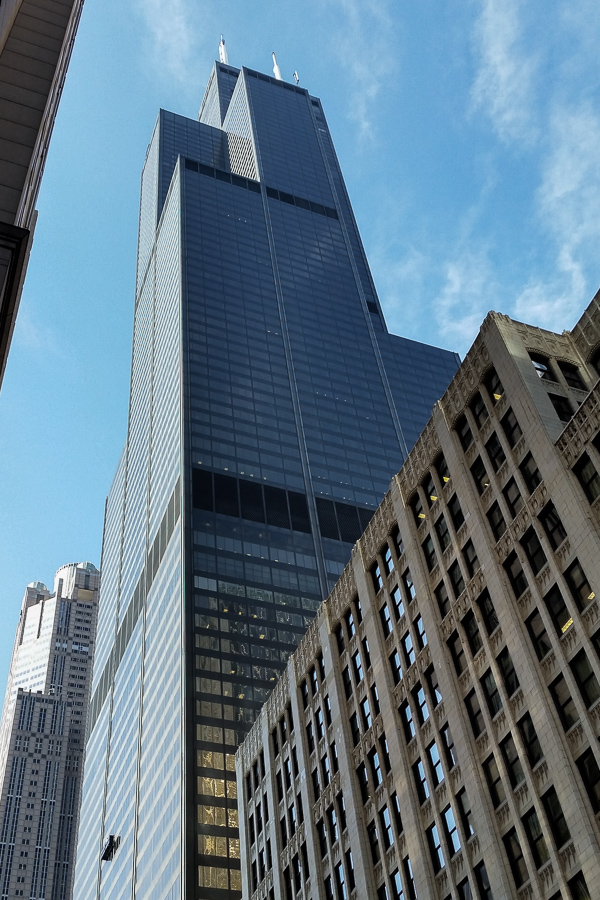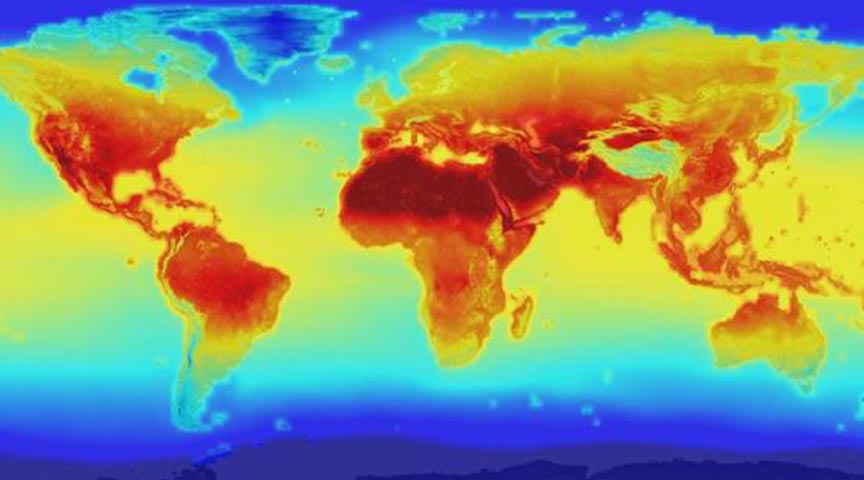It's so depressing sometimes, living in the Greatest City in North America and realizing that we have the worst pension system in the country:
The city of Chicago is the local government most burdened by unfunded retirement plans in the nation, with a pension debt that's more than eight times annual revenues, according to a new study by Moody's Investors Service.
The city's unfunded pension obligations total $29.80 billion, based on a three-year average calculated by Moody's. That is 15.9 percent of its property tax base, making it the highest in the nation by that measure as well, according to the report, which tracks the 50 largest local governments based on outstanding debt.
On the other hand, climate change is making Chicago a little more pleasant, even without the record El Niño forming in the Pacific right now. Crime is down, green space is up, and the lake is clean. It's really a great time to live here.
We are going to have to pay those pensions, though.
No matter what it's called, or how it's ranked, it's still the tallest building around:

Crain's Chicago Business has done a yeoman's job investigating the Illinois pensions crisis. Today's installment digs into how it happened:
A dense, 78-page bill aimed in part at curbing pension abuses in downstate and suburban school systems landed in lawmakers' laps two days before their scheduled May adjournment [in 2005]. One sponsor called it the first “meaningful” reform in 40 years, a reversal of “decades of neglect and bad decisions.” Another predicted that it could save the state up to $35 billion.
But in addition to true reform, the bill later signed by Gov. Rod Blagojevich allowed the state to skip half its pension payments for two years and to stretch out some expenses approved under the previous governor, George Ryan. No one mentioned those could cost $6.8 billion. The math hadn't been done.
Cumulatively, those poor decisions more than quintupled the $20 billion deficit that existed in 1995 to the current $104.6 billion, leaving a seemingly insurmountable emergency with no fix in sight.
Most charitably, the reason Illinois faces such an unholy mess may be the inability of state leaders to fathom how even slight alterations to state employee retirement plans could carry billion-dollar costs or lead to bond-rating downgrades.
Crain's has a definite point of view, and while I'm not sure I completely agree with it, they show how the bad decisions weren't confined to any party or clique. Illinois politicians of both parties showed crashing (or willful) ignorance of basic financial math for so long that it's impossible to hold any of them truly accountable. Maybe that was the plan all along.
Illinois isn't going to drop off the map, nor is Chicago going to disappear like other major industrial cities east of us have done. But we're certainly heading towards ugly negotiations with state retirees and with taxpayers. I just hope that as taxes increase to pay for our past sins, the benefits of living in a vibrant and connected urban space outweigh the increasing costs.
Something has to give, and soon. Maybe our pensions crisis will push us into electing more responsible officials. I'm not optimistic in the short run.
Problem: my keyboard suddenly wouldn't respond to the left-shift, enter, 3 or F5 keys. No idea why this is. Tested with mskey.exe, tested on another machine...still those four keys aren't working.
Solution: Get a new keyboard. Walk 10 minutes to Staples, find the same make and model, buy it, return to office.
New problem: New keyboard's spacebar is broken.
When I say "rinse and repeat" I mean that when heading back from Staples—this is the Chicago Loop, so one walks everywhere—it started to rain. Which is good, because the dewpoint is about infinity.
Now I'm cranky, damp, hot, and tired (which was a pre-existing condition today), and unproductive.
Waaah.
The three-month period ending July 31st was the wettest in Illinois history:
Illinois experienced its wettest May – July on record with 500 mm of precipitation, 200 mm above the 20th century average, according to the National Centers for Environmental Information. Most of that was due to the record precipitation of June with 240 mm statewide, based on their latest numbers and discussed in more detail here.
That is about an extra two months of precipitation during that three-month period.
Factors include the Ridiculously Resilient Ridge out west and possibly the incipient El Niño taking hold in the Eastern Pacific.
Traveling to San Francisco and London as often as I do underscores to me how crappy some things are in Chicago. Take our ridiculous transit fare systems. Metra, the heavy-rail system, still uses little paper tickets, while Ventra only works on CTA buses and trains. I want one card that would let me tap in and tap out of any public transit service in the city.
Citylab says this may be coming soon, at least to some cities:
Unified mobile ticketing means riders no longer need to worry about having the right change for the bus, or having time to buy a train ticket at the station after hitting a major traffic jam. And there’s seamless transitioning between modes of transit. But the digitization creates a lot of savings for the transit agencies themselves.
Then there’s the data. When transit operators have a massive live stream of data on how many people are buying tickets, where they are, where they’re headed, it allows for much more responsive management. They can tweak bus routes based on how the customers actually buy bus tickets and ride. Granted, this approach can’t truly transform American cities until everyone has access to the critical technology.
Given the speed of technological change in Chicago, we can probably expect this in the mid-2040s.
After two of the remaining four diagonal runways at O'Hare close later this month, the airport is planning to experiment with alternate landing runways to reduce noise:
The city has developed a concept to rotate the designated "fly quiet'' runways at night to abate noise. Instead of planes flying over the same air corridors night after night, the rotation of runways — on possibly a weekly basis — would move the worst noise impacts from one community to another, aviation officials said.
The experiment would start, pending FAA approval, after diagonal runway 32 Right closes Aug. 20, officials said. Diagonal runway 32 Left, which is scheduled to close in 2019, would be among the runways used in the rotation during the interim, officials said, adding that numerous runway combinations might be applicable to help spread out the noise.
Only one arrival runway and one departure runway are needed nightly, officials said.
Even when only east-west runways are used late at night, air-traffic controllers will be asked to direct pilots to make turns when they reach the appropriate altitude after takeoff so that noise isn't restricted to communities east and west of O'Hare, officials said.
Runways 32R and 22L are hardly ever used anymore, so the closure won't really change current operations at O'Hare. But the opening of 28L at the south end of the airport will give visitors to Chicago an extra 15 minutes of taxi time, just like 27R provides.
At least it will be a little quieter in some of the adjacent suburbs. Sometimes.
Just some of the news stories I haven't got time to read this morning:
I will now continue doing tasks from two jobs ago while I think about things I'd like to do for my current job.
We're well into our fourth day in five above 30°C, but around lunchtime a front passed that dropped the dewpoint from 22°C to 9°C. What a difference. It's still hot, but at least it's not so sticky. Walking home from trivia last night I practically swam through 25°C air with a 23°C dewpoint and lost two belt sizes along the way.
The Climate Prediction Center guesses that August will be cooler than normal, as will September and October. And I guess one week of every year we just have to take the heat. Today's dewpoint drop is very nice, though. It almost makes me want to spend more time outside. Maybe by October...
So far Chicago has had a milder-than-normal summer, with only a couple of over-32°C days and a lot of rain. Given our greenhouse gas emissions, that will change:
The NASA climate projections offer a detailed view of future temperature and precipitation patterns around the world at a 15.5 mile (25 kilometer) resolution, covering the time period from 1950 to 2100. The 11-terabyte dataset provided daily records and estimates of maximum and minimum temperatures and precipitation over the entire globe. It integrates actual measurements from around the world with data from climate simulations created by the international Fifth Coupled Model Intercomparison Project, or CMIP, which is a standard experimental protocol for studying the output of coupled atmosphere-ocean general circulation models.
The result? Pretty warm:

I won't be around to experience an average annual temperature around 30°C. Unfortunately, given the effects of climate change on our food and water supplies, not many others might be either.